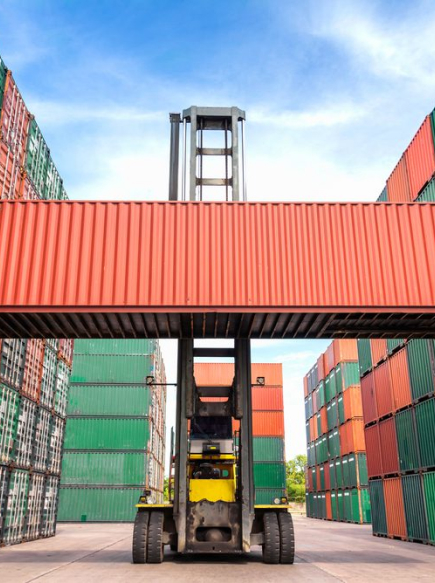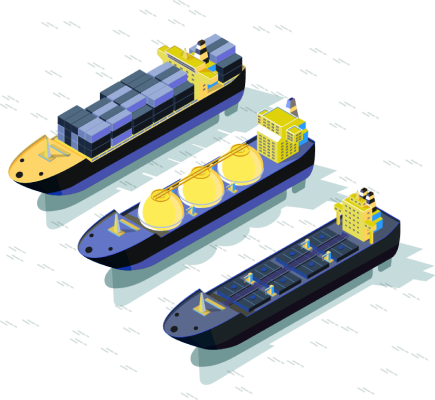Less Than Container Load
If you’re new to less than container load shipments, you may find it beneficial for your land, ocean, or air freight business. LCL shipping can be a useful option for customers who need to transport smaller shipments of goods but do not require an entire shipping container.
By working with a freight forwarder that specializes in LCL shipping, customers can ensure that their shipments are consolidated with other shipments in a way that is cost-effective, secure, and efficient. You can learn more about less than container load shipment details below.
Request a Consultation
Fill out the following form and our team will contact you to discuss your individual logistics needs.
Personal Service
Online Tracking
Global Coverage
What is less than container load?
In the freight forwarding business, a less than container load (LCL) refers to a shipment that does not require an entire container to transport. Instead, LCL shipments are consolidated with other smaller shipments to fill a container, which can help reduce shipping costs for customers who do not need to transport a large volume of goods.
LCL shipments are typically used for smaller shipments that do not require a full container but are still too large to be shipped as parcel post. This can include anything from a few pallets of goods to a few hundred cubic feet of cargo. LCL shipments are usually transported in specially designed containers that are divided into sections to accommodate multiple shipments.
Also, LCL shipping can be more cost-effective than a full container load or other shipping methods. Since multiple shipments are consolidated into a single container, the cost of transportation is shared between multiple customers, which can help lower shipping costs for everyone involved. Additionally, LCL shipping can be more flexible than other methods, since customers can book space for their shipments as needed and do not need to worry about filling an entire container.
Our Clients




Testimonials
What Our Clients Say
What is the difference between FCL & LCL?
The main difference between FCL (Full Container Load) and LCL shipments is the amount of cargo being shipped. In an FCL shipment, the cargo fills an entire container, usually a 20-foot or 40-foot container. FCL shipments are typically used when the shipper has enough cargo to fill a container or wants to avoid sharing space with other shippers. Since the shipper is paying for the entire container, FCL shipments are generally more cost-effective than LCL shipments for larger shipments.
On the other hand, LCL shipments are used when the cargo does not fill an entire container. In an LCL shipment, the cargo is consolidated with other shippers’ cargo in the same container. LCL shipments are ideal for smaller shipments or when the cargo is not enough to fill an entire container. The shipper only pays for the space they occupy in the container, which makes LCL shipments a more cost-effective option for smaller shipments.
While FCL and LCL shipments differ in terms of cargo volume, they have some similarities. Both modes of shipping use ocean freight to transport goods and may involve multiple modes of transportation, such as trucking or rail, to move the cargo to and from the port. The clearest difference between FCL and LCL shipments is the amount of cargo being shipped. FCL shipments are used for larger shipments that fill an entire container, while LCL shipments are used for smaller shipments that do not fill an entire container.


Is LCL cheaper than FCL?
Less than container load shipments are typically cheaper than full container load shipments because they allow multiple shippers to share space using a single container. With LCL shipments, the cost is usually calculated based on the volume of goods being shipped, while FCL shipments are priced based on the entire container’s capacity, regardless of how much space is used. The exact price difference between LCL and FCL shipments can vary depending on various factors, such as the distance of the shipment, the shipping company used, and the specific goods being shipped. In general, you can assume that LCL shipments will be more affordable to ship than FCL shipments, especially for smaller delivery shipments.
When estimating fair market prices for LCL and FCL shipments, there are a few things you will notice. It’s important to compare prices from different shipping companies and providers, as they may offer different rates and discounts. Additionally, the type and volume of goods being shipped can impact the final price, as can the origin and destination of the shipment.
Other factors that can impact the cost of LCL and FCL shipments include any special handling or packaging requirements, the mode of transportation used, and any customs fees or taxes that may apply. You should only work with a reputable shipping company that can provide transparent pricing and helps you understand all the costs associated with your shipment. Do your research and compare prices to ensure you’re getting a fair market price for your shipment.
What are the benefits of an LCL shipment?
LCL shipments offer a number of benefits over FCL shipments, including the following:
Cost savings
Cost savings are one of the most significant benefits of LCL shipments. The LCL price allows multiple shippers to share space in a single container, which means that you only pay for the space you need. This can be a much more cost-effective option than FCL shipping, which requires you to pay for an entire container even if you don’t need all that space.
Reduction Of Risk
LCL solutions can also help reduce the risk of damage or loss during transit. Because your cargo will be consolidated with other shipments, it is less likely to shift around during transport and suffer damage. Additionally, most LCL shipments are packaged and palletized for transport, which can help protect your goods from damage.
More Environmentally Friendly
LCL freight forwarder shipping is more environmentally friendly than FCL shipping. By consolidating multiple container loads into a single container, LCL can help reduce the number of containers required to transport goods, which can help reduce the environmental impact of shipping.
Flexibility
LCL shipments offer a high degree of flexibility, as they allow you to ship smaller volumes of goods without having to wait for a full container load. This can be especially useful if you need to ship goods on short notice or don’t have enough cargo to fill an entire container.
Better Shipping Options
LCL shipments are typically available on more shipping routes than FCL shipments, which means you have more options when it comes to choosing a carrier or route. This can help you find a shipping solution that meets your specific needs and budget.
Businesses can use the LCL shipping option when sending goods overseas, rather than having to pay the full price for space they don’t need. Talk to Dedola today to learn about how to get started on your less than container load shipments.
Frequently Asked Questions
About our Ocean Freight Forwarding Services
We know how critical your shipment is to your business. Here are some of the questions that we’ve heard in our over four decades in the industry:
Can you calculate my pricing for a shipment?
Yes. If you have the information about the weight and bulk of your items, you can ask for a quote.
What ports/countries do you serve?
Yes. If you have the information about the weight and bulk of your items, you can ask for a quote.
Certifications & Affiliations






